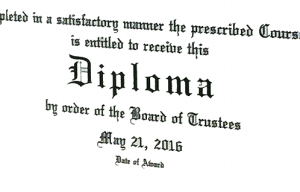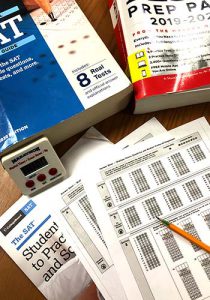 Is Your Teen Ready for College? How to Prepare Your High School Student for College
Is Your Teen Ready for College? How to Prepare Your High School Student for College
If it’s your goal for your teenager to attend a reputable college, then you’ll need to answer the following five questions to determine if he or she is truly college-ready and what you can do to increase the odds.
1. Is your teen taking a college-placement curriculum?
Competitive colleges require high school students to complete four years of math, science and English as well as two years of the same foreign language. If your teen is on track, it is vital for your child to continue passing all of his or her core subjects to avoid getting behind. In fact, you may want to send your teen to summer school to get ahead in a particular subject. If your son or daughter is not on track, it is crucial for him or her to take summer school as many times as necessary to catch up.
If you do not have a copy of the high school’s college-placement curriculum, check the school’s website or contact your child’s counselor and ask to have it sent to you.
2. Is your teen taking Advanced Placement (AP) classes?
If your son or daughter is taking AP classes, then he or she is definitely on the college path. If your teenager is not, then you should speak with the counselor to change his or her curriculum plan to include at least two AP classes for every year of high school.
Pre-AP and AP classes are more difficult than regular classes, but they will prepare your child for the rigor of college coursework. Plus, your son or daughter can earn college credit should he or she pass the AP exams taken in the 11th and 12th grades.
If your teen ever struggles in an AP class, do not allow him or her to give up and take a “regular” (i.e. easier) class. Make sure your child attends tutoring, and hire him or her a tutor if necessary. Also, do not worry too much about your child’s grade point average (GPA). High GPAs are certainly important to Tier 1 colleges, but AP courses are weighted greater than standard classes. In other words, earning a “B” in an AP class it is equivalent to earning an “A” in a non-AP class.
3. Does your teen have homework or schools projects nearly every night? (Is your teen fairly organized and disciplined?)
If your child spends at least a couple of hours nearly every weeknight working on homework or class projects, that is a good indication that he or she is taking challenging coursework. Because high-level courses demand more time, your teen will most likely display good organizational skills and be disciplined enough to set aside a usual study time.
If your child rarely has homework and spends most of the evening hours doing something leisurely, then he or she is probably not taking enough college-prep classes or probably not concerned about making high grades. If you think your teen has too much “family time” to spend, then you should speak to your child and his or her counselor to assess the situation and then come up with an action plan.
4. Is your teen involved in any organizations, clubs or sports?
Top colleges do not want students who just attended high school. They want students who were involved in high school. Someone who belongs to an organization, club or sport is more likely to be noticed by a college admissions counselor because it gives the impression that the student is well-rounded and possibly a leader.
If your child participates in at least one extra-curricular activity at school, then you can check this box. If not, speak with your child and his or her counselor and find an extra-curricular activity that would interest him or her.
5. Does your teen have any college or career goals?
If your teen has already discussed possible colleges or careers with you, this is a good sign that your son or daughter is thinking about life after high school. If your child has not discussed any college or career plans with you, then you need to initiate the conversation.
It is alright if your high schooler does not have all the answers, particularly if he or she is still an underclassman. Some students may only know the college(s) they would like to attend while others may only know the major(s) they would like to declare. What matters is that your child is thinking about college and his or her future.
What if my teen is not ready for college?
If you do not believe your teen is college-ready and you have already tried the suggestions above, then you should explore alternative education.
Private day schools normally offer smaller educational settings than public schools, so students can receive more personal instruction. Boarding schools offer a small learning environment as well, but they also provide a structured, distraction-free residence so students can focus on their studies throughout the school year. Yes, you will have to pay for these school options; but most parents find it worth the investment to see the grades — and college potential — of their unmotivated son or daughter climb.
Other educational options include homeschooling and charter schools. These alternatives, which are typically free, may be better fit. However, it is necessary to understand that these choices may not be any better than your child’s zoned public school if the home environment is not extremely structured and conducive to learning, and/or the curriculum and instruction is not strong enough to hold up to AP exams.
Enrolling your teen in an SAT or ACT preparation course is also a wise investment, as it will help gauge your son or daughter’s college readiness and also let him or her know that you are serious about college and their future.
Stay Involved
Preparing your child for college is not a simple task. Whether your teenager is self-driven or needs a lot of prodding along the way, just remember that parental involvement is the key to helping your child reach his or her college and career goals.
Remember to do three things: 1) Always keep a pulse on your child’s school performance; 2) Make any necessary changes at school and at home to help your son or daughter stay focused; and 3) Take your teen to visit as many colleges as possible to help him or her envision the future.
If you have a son with unlimited but unused potential, contact Marine Military Academy. The mission of this all-boys, college-preparatory boarding school in Texas is develop disciplined, morally strong, college-ready young men who are prepared for responsible leadership. Call (956) 423-6006 or visit MMA-TX.org to learn more.



